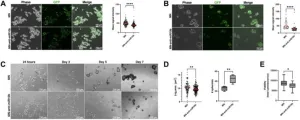(Press-News.org) August 28, 2024 — Primary care providers are well positioned to address emotional eating because of their long-term relationships with patients, noted Jana DeSimone Wozniak, PhD and Hsiang Huang, MD, MPH, of Harvard Medical School and Cambridge Health Alliance in Cambridge, Massachusetts. According to their article published in Harvard Review of Psychiatry, part of the Lippincott portfolio from Wolters Kluwer, emotional eating is associated with myriad health problems, including the experience of overweight or obesity, increased difficulty losing weight and sustaining weight loss, diabetes, and heart disease.
Traditional approaches to weight management don’t adequately address emotional eating
"Emotional eating is characterized by increased motivation for food consumption in response to stress and/or emotion and mood states," Dr. Wozniak and Dr. Huang explain. "Individuals who eat due to negative emotional states and stimuli report a tendency to consume so-called 'palatable foods' (i.e., foods high in sugar, fat, and caloric content)."
Some individuals without obesity report eating in response to negative emotions or stress, the authors say, but emotional eating is more often associated with greater body fat, waist circumference, and body mass index. Moreover, emotional eating has been linked to decreased success with traditional, behavior-based weight-loss treatments (e.g., decreasing portion sizes, caloric and fat intake, and/or amount of carbohydrates consumed).
Primary care providers are well positioned to identify emotional eating
Emotional eating often overlaps with depression, anxiety, and eating disorders, Dr. Wozniak and Dr. Huang note. They recommend using the Patient Health Questionnaire–9 (PHQ-9) and the Generalized Anxiety Disorder–7 (GAD-7) to screen for disordered eating behaviors in the context of negative emotional states or psychosocial stressors. For example, if a patient presents for weight-related concerns and reports "poor appetite or overeating" on the PHQ-9, the provider can further probe the nature of the eating disturbance and emotion-management patterns.
Primary care professionals may wish to follow up with screening tools that assess for disordered eating behaviors and life stressors. Examples suitable for primary care are the Screen for Disordered Eating, the Perceived Stress Scale–10, and the Eating Disorder Examination Questionnaire.
Dr. Wozniak and Dr. Huang caution that individuals who meet criteria for binge eating disorder (BED) may also experience emotional eating, but not everyone who experiences emotional eating meets diagnostic criteria for BED (episodes of compulsive eating that recur, on average, once per week for at least three months).
Clinical considerations for primary care providers when addressing emotional eating
Psychological interventions, particularly cognitive behavioral therapy and mindfulness-based interventions, are the standard first-line approaches for treating emotional eating, the authors say. Acceptance and commitment therapy and dialectical behavioral therapy, however, also reduce emotional eating in adults experiencing overweight or obesity, and research suggests the improvements are sustained.
The U.S. Food and Drug Administration has not approved any medications for treatment of emotional eating. However, psychopharmacologic management may be needed for underlying mental health conditions, with special attention to comorbid conditions.
Dr. Wozniak and Dr. Huang recognize that psychological interventions specifically designed to address emotional eating may not be readily available for all primary care populations. "Encouraging patients to track mood states and eating habits to generate increased awareness of antecedents to emotional eating, engaging in mindfulness-based practices via the internet or phone-based applications, and helping patients identify alternative, adaptive emotion regulation strategies may all help increase awareness of internal and external factors that contribute to and perpetuate emotional eating and encourage nonjudgmental, adaptive coping."
Read Article: Emotional Eating in Primary Care: Considerations for Assessment and Management
Wolters Kluwer provides trusted clinical technology and evidence-based solutions that engage clinicians, patients, researchers, and students in effective decision-making and outcomes across health care. We support clinical effectiveness, learning and research, clinical surveillance and compliance, as well as data solutions. For more information about our solutions, visit https://www.wolterskluwer.com/en/health.
###
About Wolters Kluwer
Wolters Kluwer (EURONEXT: WKL) is a global leader in information, software, and services for professionals in health care, tax and accounting, financial and corporate compliance, legal and regulatory, and corporate performance and ESG. We help our customers make critical decisions every day by providing expert solutions that combine deep domain knowledge with specialized technology and services.
Wolters Kluwer reported 2023 annual revenues of €5.6 billion. The group serves customers in over 180 countries, maintains operations in over 40 countries, and employs approximately 21,400 people worldwide. The company is headquartered in Alphen aan den Rijn, the Netherlands.
For more information, visit www.wolterskluwer.com, follow us on LinkedIn, Facebook, and YouTube.
END
Primary care providers urged to assist patients who engage in emotional eating
Familiar psychological interventions can play a role in the management of emotional eating in primary care settings
2024-08-28
ELSE PRESS RELEASES FROM THIS DATE:
Half of Uber, Lyft trips replace more sustainable options
2024-08-28
More than 50% of ride-hailing trips taken by surveyed riders in California replaced more sustainable forms of transportation — such as walking, cycling, carpooling, and public transit — or created new vehicle miles, according to a study from the University of California, Davis Institute of Transportation Studies.
The study was conducted to help guide development of the Clean Miles Standard, a state regulation designed by the California Air Resources Board to reduce the greenhouse gas emissions from ride-hailing services.
Published in Transportation Research ...
miR-10b Inhibition: A strategy for treating metastatic breast cancer
2024-08-28
“We have developed a nanodrug, termed MN-anti-miR10b, that delivers anti-miR-10b antisense oligomers to cancer cells.”
BUFFALO, NY- August 28, 2024 – A new research paper was published in Oncotarget's Volume 15 on August 26, 2024, entitled, “Inhibition of miR-10b treats metastatic breast cancer by targeting stem cell-like properties.”
As stated within the Abstract of the paper, despite advances in breast cancer screening and treatment, the prognosis for metastatic disease remains dismal, with ...
Love is blind for male fruit flies who will choose sex over safety
2024-08-28
Male fruit flies will become oblivious to physical danger as they become more engaged in courtship and sex, new research shows.
Researchers at the University of Birmingham have shown that pursuit of a coveted reward – in this case a female fly – will cause a male fruit fly to ignore threats such as predation.
In the study, published today (28 Aug) in Nature, the team was able to show for the first time the neural networks in the fly’s brain that direct this decision-making process, revealing the neurotransmitter dopamine has a leading role to play.
Lead researcher Dr Carolina Rezaval said: “Every day we make decisions that require us to ...
Kidney donors’ risk of death at all-time low
2024-08-28
The risk of death for people who donate a kidney for transplantation — already small a decade ago — has dropped by more than half since then, a new study shows.
Each year, roughly 6,000 Americans volunteer to donate a kidney, according to the Organ Procurement and Transplantation Network. Before undergoing the procedure, donors are informed of the potential risks, including death. Based on data from 1995 through 2009, experts had originally predicted that about three of every 10,000 donors were likely to die within three months of the procedure. The authors of the ...
Thirty-year trends in perioperative mortality risk for living kidney donors
2024-08-28
About The Study: Perioperative mortality after living donation declined substantially in the past decade compared with prior decades, to fewer than 1 event per 10,000 donations. Risk was higher for male donors and donors with a history of hypertension. Current guidelines for donor informed consent, based on 2009 data, should be updated to reflect this information.
Corresponding Author: To contact the corresponding author, Dorry L. Segev, MD, PhD, email dorry.segev@nyulangone.org.
To access the embargoed study: Visit our For The Media website at this link https://media.jamanetwork.com/
(doi:10.1001/jama.2024.14527)
Editor’s Note: Please ...
Intersection of poverty and rurality for early-onset colorectal cancer survival
2024-08-28
About The Study: Patients with early-onset colorectal cancer (defined as colorectal cancer diagnosed in individuals younger than 50 years) living in rural areas had lower 5-year survival rates than their urban dwelling counterparts in this study. While it was not observed consistently for all age groups, persistent poverty in these rural areas may compound this association.
Corresponding Author: To contact the corresponding author, Meng-Han Tsai, PhD, metsai@augusta.edu.
To access the embargoed study: Visit our For The Media website at this link https://media.jamanetwork.com/
(doi:10.1001/jamanetworkopen.2024.30615)
Editor’s Note: Please ...
First-generation antihistamines and seizures in young children
2024-08-28
About The Study: Prescriptions for first-generation antihistamines were associated with a 22.0% higher seizure risk in children, especially in those ages 6 to 24 months in this cohort study. These findings emphasize the need for careful and judicious prescription of first-generation antihistamines in young children and underline the need for further research to elucidate associations between antihistamine prescriptions and seizure risk.
Corresponding Authors: To contact the corresponding authors, email Seonkyeong Rhie, MD, (starclusters@gmail.com) and Man Yong Han, MD, (drmesh@gmail.com).
To ...
Prioritizing the unexpected: New brain mechanism uncovered
2024-08-28
Researchers have discovered how two brain areas, neocortex and thalamus, work together to detect discrepancies between what animals expect from their environment and actual events. These prediction errors are implemented by selective boosting of unexpected sensory information. These findings enhance our understanding of predictive processing in the brain and could offer insights into how brain circuits are altered in autism spectrum disorders (ASDs) and schizophrenia spectrum disorders (SSDs).
The research, published today in Nature, outlines how scientists at the Sainsbury Wellcome Centre at UCL studied mice in a virtual reality ...
More people at risk of hereditary heart disease than thought
2024-08-28
More people in the UK are at risk of a hereditary form of cardiac amyloidosis, a potentially fatal heart condition, than previously thought, according to a new study led by researchers at UCL (University College London) and Queen Mary University of London.
The study, published in JAMA Cardiology, used data from the UK Biobank to analyse the genes of 469,789 people in the UK and found that one in 1,000 possessed genetic variants with a likely link to cardiac transthyretin (ATTR) amyloidosis.
Among ...
Breaking open the AI black box, team finds key chemistry for solar energy and beyond
2024-08-28
CHAMPAIGN, Ill. — Artificial intelligence is a powerful tool for researchers, but with a significant limitation: The inability to explain how it came to its decisions, a problem known as the “AI black box.” By combining AI with automated chemical synthesis and experimental validation, an interdisciplinary team of researchers at the University of Illinois Urbana-Champaign has opened up the black box to find the chemical principles that AI relied on to improve molecules for harvesting solar energy.
The result produced light-harvesting molecules four times more stable than ...
LAST 30 PRESS RELEASES:
ASU researchers to lead AAAS panel on water insecurity in the United States
ASU professor Anne Stone to present at AAAS Conference in Phoenix on ancient origins of modern disease
Proposals for exploring viruses and skin as the next experimental quantum frontiers share US$30,000 science award
ASU researchers showcase scalable tech solutions for older adults living alone with cognitive decline at AAAS 2026
Scientists identify smooth regional trends in fruit fly survival strategies
Antipathy toward snakes? Your parents likely talked you into that at an early age
Sylvester Cancer Tip Sheet for Feb. 2026
Online exposure to medical misinformation concentrated among older adults
Telehealth improves access to genetic services for adult survivors of childhood cancers
Outdated mortality benchmarks risk missing early signs of famine and delay recognizing mass starvation
Newly discovered bacterium converts carbon dioxide into chemicals using electricity
Flipping and reversing mini-proteins could improve disease treatment
Scientists reveal major hidden source of atmospheric nitrogen pollution in fragile lake basin
Biochar emerges as a powerful tool for soil carbon neutrality and climate mitigation
Tiny cell messengers show big promise for safer protein and gene delivery
AMS releases statement regarding the decision to rescind EPA’s 2009 Endangerment Finding
Parents’ alcohol and drug use influences their children’s consumption, research shows
Modular assembly of chiral nitrogen-bridged rings achieved by palladium-catalyzed diastereoselective and enantioselective cascade cyclization reactions
Promoting civic engagement
AMS Science Preview: Hurricane slowdown, school snow days
Deforestation in the Amazon raises the surface temperature by 3 °C during the dry season
Model more accurately maps the impact of frost on corn crops
How did humans develop sharp vision? Lab-grown retinas show likely answer
Sour grapes? Taste, experience of sour foods depends on individual consumer
At AAAS, professor Krystal Tsosie argues the future of science must be Indigenous-led
From the lab to the living room: Decoding Parkinson’s patients movements in the real world
Research advances in porous materials, as highlighted in the 2025 Nobel Prize in Chemistry
Sally C. Morton, executive vice president of ASU Knowledge Enterprise, presents a bold and practical framework for moving research from discovery to real-world impact
Biochemical parameters in patients with diabetic nephropathy versus individuals with diabetes alone, non-diabetic nephropathy, and healthy controls
Muscular strength and mortality in women ages 63 to 99
[Press-News.org] Primary care providers urged to assist patients who engage in emotional eatingFamiliar psychological interventions can play a role in the management of emotional eating in primary care settings




